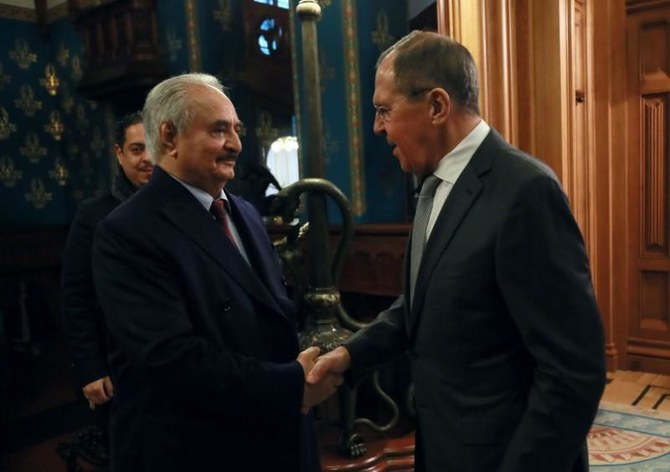ANKARA: As Kremlin announced the ongoing consultations between Turkey and Russia for an immediate cease-fire deal for the longstanding Libyan conflict, the feasibility of such an agreement is being questioned more and more as the two countries support opposing sides.
Russian Foreign Minister Sergei Lavrov said the Libyan National Army (LNA), backed by Russia and led by eastern Libyan Commander Khalifa Haftar, is willing to sign a cease-fire document. Russia expects Ankara to convince the Government of National Accord (GNA) to proceed in the same way.
The ministerial-level talks have been ongoing for a while, with some postponements last month over the technical disagreements.
Samuel Ramani, a Middle East analyst at the University of Oxford, is skeptical about a cease-fire working on the ground.
“The Libyan war is much more complicated than a mere Russia-Turkey proxy war, even though it is often oversimplified to this binary in Western media outlets. The UAE and Egypt will be much more hesitant than Russia about signing a peace deal with Turkey and might not view such as a ceasefire as credible,” he told Arab News.
According to Ramani, Haftar’s military actions in Libya could continue.
“Alternatively, Turkey has powerful interests against a cease-fire at this time and has also escalated tensions with France. Moreover, when Russia says the LNA is on board, there is a question as to whether he means Libyan House of Representatives Chief Aguila Saleh, who might be, or Haftar,” Ramani said.
Experts insist that the spheres of influence in Libya should be clearly outlined to prevent another failed cease-fire.
Regarding the red lines for a cease-fire, Ramani thinks that freezing the conflict areas in and around LNA-held Sirte and Jufra is an immediate priority.
Sirte bears strategic importance as it lies close to key energy export terminals on the Mediterranean shores, while Jufra hosts a strategic military base where Russian aircraft and Wagner mercenaries are reportedly located.
“An escalation from either side in these areas would be a red line. Also, there is a need for assurances from both sides that they won’t restart a broader war if they perceive their rivals as being weak,” Ramani said.
Aydin Sezer, an expert on Turkey-Russia relations, thinks that Russia is concerned about the increasing military support that Turkey gives to the GNA, which further escalates tension in the civil war.
“The only priority right now for Russia is to achieve a lasting peace through a sustainable ceasefire agreement. The same goes for France. Both these countries are also set to bring this issue to the UN Security Council. These latest ceasefire negotiations mean Russia wants to keep the diplomacy doors open for both sides,” he told Arab News.
Saturday’s attack targeting the strategic Al-Watiya air base in Libya damaged Turkish air defense systems where Turkey was reportedly planning to establish a permanent presence. The attack also came a couple of hours after Turkish Defense Minister Hulusi Akar visited Libya.
“After that attack, Ankara felt obligated to be much more cautious regarding the fragile dynamics in Libya. The situation on the ground is complicated and time is not on the Turkish side. Therefore, the cease-fire is necessary for Ankara more than ever,” Sezer said.
For Wolfram Lacher, however, senior associate at the German Institute for International and Security Affairs, Russia and Turkey may well try to broker a ceasefire and thereby become the two key players in Libya, but it is doubtful whether such a cease-fire could succeed.
“Haftar has more room to maneuver with regard to Russia than Turkey has with regard to the GNA because he can still rely on Egyptian and UAE support. So, he may reject the terms of a Russian-Turkish ceasefire,” Lacher told Arab News.
According to Lacher, other powers — including the US, France, Egypt and the UAE — want to prevent a Russian-Turkish arrangement in Libya and instead want ceasefire talks to take place under the UN auspices.
“This competition over the forum for ceasefire talks will also make any cease-fire initiative more difficult,” he said.
On the other hand, Bill Park, senior lecturer in the Department of Defense Studies at King’s College London, thinks Moscow is uncomfortable with the implications of Turkey’s escalation in Libya.
“Russia wants to demonstrate that there might be limits to what it will tolerate,” he told Arab News. “At this stage, Ankara should be willing to take risks while Russia should meet the challenges for a negotiated agreement and manage the hostility between France and Turkey.”



























